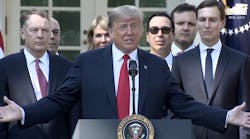The United States and Canada reached an agreement on a new trade deal shortly before a US-imposed deadline Sunday night.
President Donald Trump praised the new deal, dubbed the United States Mexico Canada Agreement (USMCA)—which replaces the North American Free Trade Agreement (NAFTA)—Monday, Oct. 1, during a Rose Garden news conference.
The US and Mexico agreed in principal to revise key portions of NAFTA on Aug. 27.
“USMCA is a great deal for all three countries, solves the many deficiencies and mistakes in NAFTA, greatly opens markets to our farmers and manufacturers, reduces trade barriers to the US and will bring all three Great Nations together in competition with the rest of the world,” Trump said.
US Trade Representative Robert Lighthizer and Canadian Foreign Affairs Minister Chrystia Freeland praised the renamed accord in a joint statement.
“Today, Canada and the United States reached an agreement, alongside Mexico, on a new, modernized trade agreement for the 21st Century: the United States-Mexico-Canada Agreement (USMCA). USMCA will give our workers, farmers, ranchers and businesses a high-standard trade agreement that will result in freer markets, fairer trade and robust economic growth in our region. It will strengthen the middle class, and create good, well-paying jobs and new opportunities for the nearly half billion people who call North America home.
“We look forward to further deepening our close economic ties when this new agreement enters into force.
“We would like to thank Mexican Economy Secretary Ildefonso Guajardo for his close collaboration over the past 13 months.”
According to a post at whitehouse.gov, the deal delivers on Trump’s promise to negotiate a “modern and rebalanced trade deal with Mexico and Canada,” which politicians previously were unable to accomplish.
The White House said the new agreement “will update and rebalance the 24-year-old NAFTA with modern provisions to serve the interests of American workers and businesses.”
Key provisions that the White House touted include new rules of origin requiring 75 percent of auto content to be produced in North America, which is designed to benefit American auto manufacturers and workers, and “billions of dollars” in new incentives for US vehicle and auto parts production.
“USMCA will bring our trade relationship with Canada and Mexico into the 21st century,” the White House said.
Trump said steel and aluminum tariffs, which are separate from USMCA, will stay in place for the time being, and the new agreement “will transform North America back into a manufacturing powerhouse. (It will) allow us to reclaim a supply chain that has been offshored because of unfair trade issues.”
The president said Monday he plans to sign the deal by the end of November, after which it will be submitted to the US Congress for approval, a senior US official said on a conference call.
“It’s a big win for the North American economy and the three inter-dependent trading partners," said Dan Furth, president of National Tank Truck Carriers. “As many of our carriers operate in all three countries, the new agreement offers greater economic stability for the tank truck industry. A great deal of the products hauled in tank trucks go into auto manufacturing across North America, so a more level playing field in the automotive markets is also helpful to our industry. Our industry supports free trade and the remaining tariffs on steel and aluminum cause issues for tank trailer manufacturing within the three partner countries.
“I believe that simply getting this elusive USMCA deal across the finish line creates industry optimism for important trade discussions further on down the road.”
The American Trucking Associations (ATA), Motor & Equipment Manufacturers Association (MEMA) and the Canadian Vehicle Manufacturers Association (CVMA) also issued statements in support of the new trade agreement framework.
“ATA is pleased that the United States, Canada and Mexico will continue their nearly 25-year-long tradition of free and open trade among North American neighbors,” said Chris Spear, ATA president and CEO. “The wide-ranging pact is a positive step for the nearly 50,000 Americans working in jobs directly connected to cross-border trucking—as well as the more than seven million Americans working in trucking-related jobs.”
MEMA echoed ATA’s reaction, saying it was critical for all three parties to be involved.
“The previous NAFTA, nearly 25 years old, was due for modernization, while ensuring the open and free market our members rely upon to remain globally competitive,” the association said. “The potential strength and longevity of this agreement will be in the details. In the coming days, MEMA will be carefully reviewing the agreement to gauge how its provisions and rules will affect motor vehicle parts manufacturing, the largest sector of manufacturing jobs in the United States.
“Meanwhile, MEMA applauds the three countries, who have worked hard over the last several months to reach this agreement, for their persistence and determination in creating a new NAFTA that helps protect and preserve American jobs.”
CVMA took a more cautiously optimistic view of the initial agreement.
“The CVMA congratulates the Canadian government in finalizing the new agreement on a trilateral North American basis,” it said. “While we look forward to reviewing the details pertaining to automotive trade more closely, the Canadian negotiating team is to be commended on reaching a modernized agreement which provides certainty and builds a strengthened platform for trade across the industry. We look forward to updates and working with government towards finalizing and implementing the USMCA."










